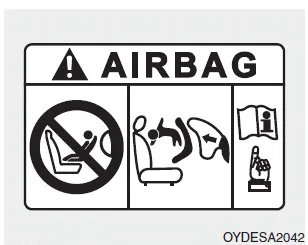Hyundai i30 (PD): Air bag - supplemental restraint system / What to expect after an air bag inflates
After a frontal or side air bag inflates, it will deflate very quickly. Air bag inflation will not prevent the driver from seeing out of the windscreen or being able to steer. Curtain air bags may remain partially inflated for some time after they deploy.
WARNING
After an air bag inflates, take the following precautions:
- Open your windows and doors as soon as possible after impact to reduce prolonged exposure to the smoke and powder released by the inflating air bag.
- Do not touch the air bag storage area’s internal components immediately after an air bag has inflated. The parts that come into contact with an inflating air bag may be very hot.
- Always wash exposed skin areas thoroughly with cold water and mild soap.
- We recommend that a HYUNDAI authorised repairer replace the air bag immediately after deployment. Air bags are designed to be used only once.
Noise and smoke from inflating air bag
When the air bags inflate, they make a loud noise and may produce smoke and powder in the air inside of the vehicle. This is normal and is a result of the ignition of the air bag inflator. After the air bag inflates, you may feel substantial discomfort in breathing because of the contact of your chest with both the seat belt and the air bag, as well as from breathing the smoke and powder. The powder may aggravate asthma for some people. If you experience breathing problems after an air bag deployment, seek medical attention immediately.
Though the smoke and powder are nontoxic, they may cause irritation to the skin, eyes, nose, throat, etc. If this is the case, wash and rinse with cold water immediately and seek medical attention if the symptoms persist.
Do not install a Child Restraint System on the front passenger seat

Never install a Child Restraint System in the front passenger seat, unless the air bag is deactivated
WARNING
NEVER use a rearward facing Child Restraint on a seat protected by an ACTIVE AIRBAG in front of it, DEATH or SERIOUS INJURY to the CHILD can occur.
The SRS consists of the following components: (1) Driver's front air bag module/ Driver’s knee air bag module (2) Passenger's front air bag module (3) Side air bag modules/ Side impact sensors (4) Curtain air bag modules (5) Rear Retractor pre-tensioner (6) Retractor pre-tensioner assemblies (7) Air bag warning light (8) SRS control module (SRSCM)/ Rollover sensor (9) Front impact sensors (10) Side pressure sensors (11) Passenger’s front air bag ON/OFF indicator (12) Passenger’s front air bag ON/OFF switch The SRSCM continually monitors all SRS components whilst the ignition switch is ON to determine if a crash impact is severe enough to require air bag deployment or pre-tensioner seat belt deployment.
There are certain types of accidents in which the air bag would not be expected to provide additional protection. These include rear impacts, second or third collisions in multiple impact accidents, as well as low speed impacts.
Other information:
Hyundai i30 (PD) 2018-2024 Owner's Manual: Parking brake
Checking the parking brake Check the stroke of the parking brake by counting the number of “clicks’’ heard whilst fully applying it from the released position. Also, the parking brake alone should securely hold the vehicle on a fairly steep grade.
Hyundai i30 (PD) 2018-2024 Owner's Manual: Headlamp and front fog lamp aiming
Headlamp aiming 1. Inflate the tyres to the specified pressure and remove any loads from the vehicle except the driver, spare tyre, and tools. 2. The vehicle should be placed on a flat floor. 3. Draw vertical lines (Vertical lines passing through respective head lamp centres) and a horizontal line (Horizontal line passing through
Categories
- Manuals Home
- Hyundai i30 Owners Manual
- Your vehicle at a glance
- Maintenance services
- Trip computer
- New on site
- Most important about car
